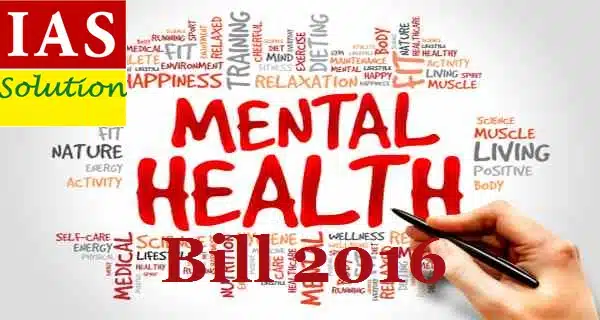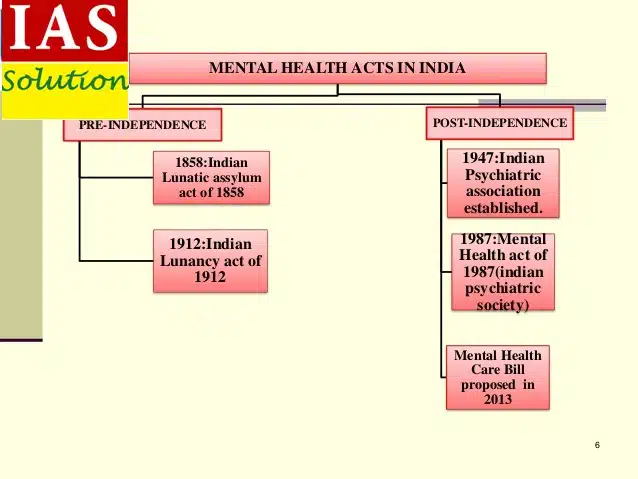Mental Health Care Bill 2017 – Everything you need to know

Background of Mental Health Care Bills in India
Mental health care acts in India comprises of two phases- pre independence and post independence phase.
Pre independence phase
- Indian lunatic asylum act of 1858
- Indian lunacy act of 1912
Post independence phase
- Establishment of Indian psychiatric society [IPS] in 1947
- Mental Health Act of 1987
Mental Health Care Bill 2017
The mental health act replaced Indian Lunacy Act of 1912. Earlier Indian Lunacy Act replaced Indian lunatic asylum act of 1858. Now mental health care bill 2016 will replace mental health act of 1987.
Incidence of Mental illness in India
A recent study conducted by national institute of mental health and neurosciences [NIMHANS] showed a shocking prevalence of mental illness in India. According to the study 13.7% of general population of the country is suffering from serious mental disorders. Moreover, 10.6% of the population needs immediate intervention. The incidence of mental morbidity was high in urban India, disorders like schizophrenia, mood disorders neurotic and stress related disorders accounted for this.
Definition of mental illness according to Mental Health Care Bill 2017 as follows:
“Disorder of mood, thought, perception, orientation and memory which causes significant distress to a person or impairs that person’s ability to meet the demands of daily life and includes mental conditions associated with the abuse of alcohol and other drugs, but does not include mental retardation.”
The bill consists of 16 chapters and 137 clauses. The main aim of the Mental Health Care Bill 2017 is to prevent discrimination from the society towards mentally ill. Further, this bill aims to reduce economic and psychological burden taken up by families of mentally ill. MHA -1987 failed to protect the rights of mentally ill and promote access to mental health care across the country.
Also read: Citizenship Amendment Bill (CAB) 2019 – All you need to know
Features of the Mental Healthcare Bill 2017
- Decriminalising suicide
- Mental health treatment
- Prohibition of electro convulsive therapy [ECT], without use of muscle relaxants and anesthesia.
- Prohibition of sterilization as a mode of psychiatric treatment.
- Prohibition of chaining of patients.
- Psychosurgery with informed consent and approval of MHRB [Mental Health Review Board].
- Protection of rights of patients with mental illness.
- Advance directive.
- Setting up of mental health authority [MHA].
Decriminalisation of suicide
A person who attempts to commit suicide shall be presumed to be suffering from mental illness at that time and will not punished under law. According to Mental Health Care Bill 2017 , it’s the duty of the government to provide care, treatment and rehabilitation to a client who is undergoing severe stress and attempted to commit suicide. Therefore, reducing the recurrence of suicide attempts.
Mental health treatments
The bill specifies the policy and procedures in relation to admission, treatment and discharge of mentally ill. A mental health practitioner or professional shall not be liable for unseen consequences on following an advance directive.
Prohibition of ECT- without use of muscle relaxants or anesthesia. Furthermore, ECT should not be performed for minors.
Sterilization– sterilization will not to be performed on mentally ill as a treatment modality.
Chaining of patients– Patients shall not be chained under any circumstances.
Seclusion– A mentally ill client shall not be subjected for seclusion or solitary confinement. Only physical restraint is recommended if necessary.
Protection of Rights of Mentally ill
The bill ensures that every person have right to access mental health care and treatment from mental health services either run or funded by government.
Free treatment
The bill also ensures free treatment to homeless or those who are below poverty line, even without BPL card.
- Right to live with Dignity- Every mentally ill person has right to live with dignity and shall not be subjected to any discrimination with regards to gender, sex , sexual orientation, religion, culture, caste, social or political beliefs class or disability.
- Right to Confidentiality- in respect to mental health, health care treatment and physical health care.
- Right to Privacy- the photograph or any other information pertaining to person cannot be released to media without the consent of the person.
Advance Directive
A mentally ill person has right to make an advance directive with respect to his/her treatment and regarding nominated representative.
Certification of advance directive – It is certified by a medical practitioner or registered with mental health board.
Cancellation of advance directive- The mental health professional/relative/care giver does not wish to follow advance directive during treatment of the person, he / she can make an application to mental health board for review/alteration/cancellation of advance directive.
Mental Health Authority
The Mental Health Care Bill 2017 provides provisions for government to set up a central mental health authority t national level and state mental health authority at state level. All mental health practitioners including clinical psychologists, mental health nurses and psychiatric social workers are to be registered with this authority.
Functions of Mental Health Authority [ST-CA]
- Supervision and registration [S] – These bodies will register, supervise as well as maintain a record of all mental health establishments. Moreover, it also maintains a record of all mental health professionals. It develops quality and service norms to mental health establishments.
- Training [T] – provides training to law enforcement officials and mental health professionals regarding provisions of the act.
- Complaints and deficiencies [C] – It will receive complaints about deficiencies in relation to provision of services.
- Advisory body [A] – It acts as an advisory body to government in matters pertaining to mental health.
Apart from mental health authority a mental health review board will be formed that aims to protect the rights of mentally ill persons and manage advance directives.
Also read : Uniform Civil Code :Advantages and disadvantages
Drawbacks of Mental Health Care Bill 2017
Management of property – unlike MHA-1987, it does not provide any clear information regarding the management of property of the mentally ill persons. It is a matter of serious concern as these persons can be subjected to exploitations in regards to property.
Financial constraints – the bill does not provide information regarding the expenditure. Moreover, it does not make it clear regarding sharing of expenses with central and state governments. However, several states face financial constraints so that additional expense cannot be handled by these states. The central governments should have to allocate necessary funds to respective states. Otherwise, proper implementation of the bill cannot be taken place.










Leave a Reply